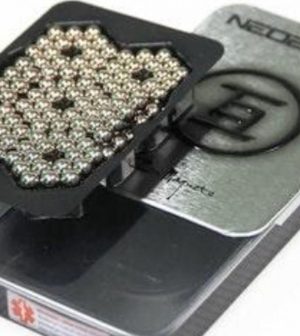- Understanding the Connection Between Anxiety and Depression
- How Daily Prunes Can Influence Cholesterol and Inflammation
- When to Take B12 for Better Absorption and Energy
- Epsom Salts: Health Benefits and Uses
- See What Saffron Can Do for Sleep and Heart Health
- 6 Common Mistakes to Avoid Before Your Physical
- Can Sweating Really Help You Beat a Cold?
- Strengthening Your Relationship: Practical Strategies
- Skip Storing This Everyday Product in the Fridge Door
- Green Tea + B3 Pairing May Boost Brain Health
Child Injuries, Deaths Spur Recall of 10 Million Magnet Balls, Cubes

Ten million high-powered magnetic balls and cubes have been recalled in the United States because they pose a risk of serious injury or death if swallowed, a new report shows.
“Zen Magnets LLC is aware of two children who ingested Zen Magnets and required surgery to remove the magnets and parts of their intestines and bowels. In addition, CPSC [the Consumer Product Safety Commission] is aware of other reports of children and teenagers ingesting high-powered magnets and requiring surgery. A 19-month-girl died after ingesting similar high-powered magnets,” the CPSC said in a news release.
It said Zen refused to issue a voluntary recall, so the CPSC sued the Colorado-based company to force a mandatory recall.
It includes all Zen Magnets and Neoballs magnets, which are high-powered 5 millimeter (mm) spherical magnets. Zen Magnets were sold individually and in sets of 72; 216 with six spares; and 1,728 with 8 spares. Neoballs were sold individually and in sets of various colors — silver, gold, red, orange, green, blue and purple.
The products were sold online at Neoballs.com and ZenMagnets.com beginning in January 2009 for $12 to $264 per set, or individually for 6 cents to 10 cents per magnet.
When high-powered magnets are swallowed, they can interact with each other or other metallic objects and become lodged in the digestive system, leading to perforations, twisting and/or blockage of the intestines, infection, blood poisoning and death, the CPSC said.
“When consumers see these products marketed for children on trusted e-commerce sites, many of these items sold by foreign firms, consumers assume they are safe,” said Robert Adler, acting chairman of CPSC. “But the reality is, these magnets can cause lifelong injury, or worse, to kids. That’s why it’s so important that e-commerce sites not allow these products to be sold to kids and why kids are safest when these products are not in the home.”
From 2009 to 2018, there were two deaths in the United States and at least 4,500 cases related to small magnet ingestion were treated in U.S. hospital emergency departments. Most involved children between 11 months and 16 years of age, according to the CPSC.
“The sad truth is we’re playing whack-a-mole with these dangerous products, and each one we miss could have grave consequences for young children and teens,” Adler said. “But until we can get these products off the market entirely, we just have to be vigilant.”
Parents and other caregivers need to make sure kids understand the dangers of swallowing magnets. They need to know never to put magnets near their mouth or nose while playing or use the magnets like piercings, the CPSC said.
Remove magnet sets, small magnets and small pieces containing magnets from homes with children who might mistakenly, or intentionally, swallow them, CPSC advised.
Watch for loose magnetic pieces and regularly inspect toys and children’s play areas for missing or dislodged magnets.
Seek immediate medical attention if you suspect your child may have swallowed a magnet.
Parents and caregivers should visit CPSC’s website to see if their child’s magnetic toys have been recalled. If they have been recalled, stop using them immediately, the commission advises, and get the remedy offered by the firm.
More information
The Consumer Product Safety Commission has more on magnets.
SOURCE: U.S. Consumer Product Safety Commission, news release, Aug. 17, 2021; Associated Press, Aug. 17, 2021
Source: HealthDay
Copyright © 2026 HealthDay. All rights reserved.










